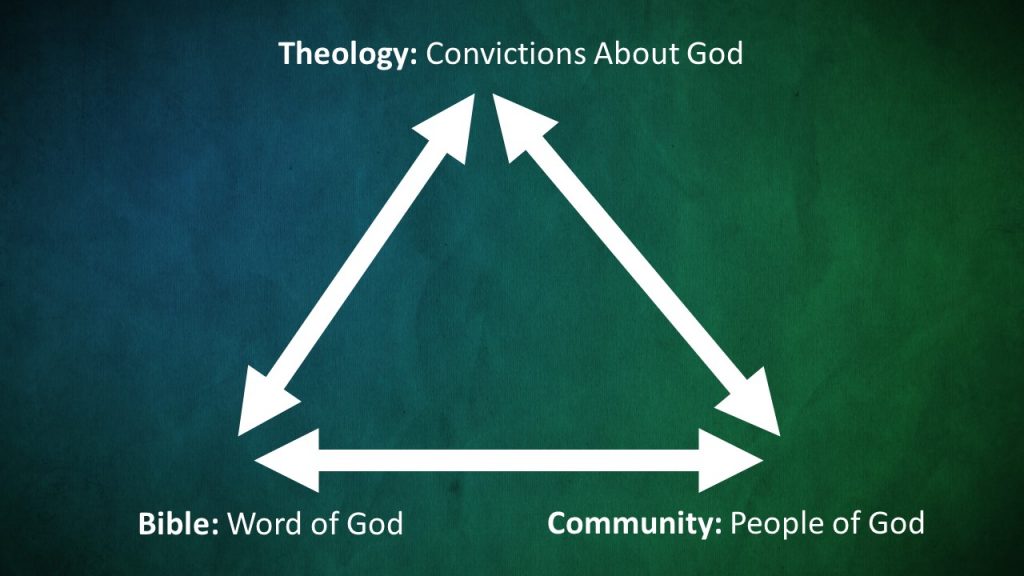As a pastor, writer, and leader, I have a real-world stake in understanding how individuals and groups of people discern God’s intent for their lives.
For believers, worldview and practice pivot on an understanding of God’s will. If God is real, and if God desires certain behaviors and outcomes for humanity, these ends must be carefully pursued and followed.
The work of intepreting God’s will, especially in light of scripture, is called hermeneutics. Hermeneutics involves the arrangement of individual presuppositions, cultural lenses, and personal thought-patterns as the Bible is read.
This task is of the utmost importance.
But make no mistake: It’s difficult.
Look around: Christians are divided on a host of issues. We can’t even agree on the basics.
So what triggers these conflicts? How can believers reading the one and the same Bible reach such divergent conclusions about its application?
The answers, I believe, have much to do with where individual believers stand within something I’m calling the hermeneutical triangle. I’d love to “field test” this model with you:
It occurs to me that the hermeneutical event comprises a complex/beautiful dynamism among three constituent parts: The Word of God, the People of God, and our Theology of God. When questions about morals, posture, and worldview are placed before believers, they respond and act on the basis of their location within this triangle:

The Word of God is Scripture: These are the sacred, special revelations of the Old and New Testaments. The Word of God is the Biblical text – the Law, the Prophets, the Writings, the Gospels, and the Letters. These sixty-six books were originally written in Hebrew, Aramaic, and Greek, and have since been translated into the myriad languages of the world.
We are speaking about the the Word of God when we cite passages like “Honor your father and your mother” and “Render to Caesar” and “I am making all things new!”
In some sense, there is an alluring “safety” to forsaking all other revelation but the plain text of the Bible. I’m tempted by “bibliomonism” myself.
But it can’t be as simple as this, for reasons noted below.
Reading the Word of God involves the tasks of exegesis, comparative analysis, and source criticism. These projects, along with translation and other textual “sciences”, strive to achieve an authentic and faithful record of the autographs, the original writings of the Bible’s authors.
The People of God is Community. This is the Church – the flesh-and-blood men and women who together hail Jesus as Lord of All.
The first People of God were bedouins who met God in the desert, slaves who experienced deliverance from chains, merchants who went about in ships, and tentmakers who challenged the emperor.
The People of God live on today. They gather for worship and sacrament. They live in a spectrum of diverse cultures and engage non-believers, past believers, and potential believers. Their eyes and ears bear witness to God’s natural revelation in the world around them.
The Community is preachers and plumbers, elder boards and Sunday school classes. It is comprised of individuals whose perspectives are winnowed, refined, and challenged by the views of others they know. All of these persons bring biases and blindspots, as well as rich personal insights, into the hermeneutical process.
The Theology of God are the Convictions we have about God. This is the wisdom of the ancients and the ongoing work of pastors, scholars, and teachers. This is Augustine, Aquinas, Teresa, Bonhoeffer, and Newbigin.
Our theological values present in phrases like “the Bible is inerrant” and “God’s love is the strongest force in the universe” and “Jesus listens to me as I pray.” Our theology animates our anthropological assumptions and our ethical expectations.
As it pertains to revelation and discernment, one of the most important fields of focus is pneumatology. Pneumatology is the special area of theological reflection that, in part, explores how the Holy Spirit interacts with human beings as they wonder, pray, and process about God’s intent for the world. In many theological traditions, the Holy Spirit is understood to illumine and instruct the People of God as they read the Word of God.
There are many interesting concepts surrounding these three contributing factors that we could discuss if we had more time. Here’s one:
There is a great difference in the pace at which these elements change. Theology develops at a relatively slow pace. Because the canon is closed, the contents of the Bible itself have stopped changing. The People of God, on the other hand are always changing.
Again, that’s just one factor operative inside the hermeneutical triangle.
Zooming out: What’s apparent to me is that each of these three constituent elements informs the other two. But it’s more than that In some ways, each of the two shapes the third.
- The People of God are formed by the revealed Word and around the theological convictions that help them understand the movements of God.
- Christian theology derives from the deep truths of the Bible experienced in the challenges, joys, and heartaches of human experience.
- And – hang in there with me; I know this one is more difficult – the Word of God comes to us as the logged record of the People of God working out their experiences of God based on their beliefs about God.
Remember: many faithful persons (Abraham and Sarah, etc.; see Hebrews 11) discerned God’s will without any scripture at all. Others – people like Paul and Isaiah and Matthew – actually produced the Bible, penning its nouns and verbs under the direction of the Holy Spirit.
Another set of God’s people, operating according to Fourth Century theological norms and under the Spirit’s direction, worked out the final contents of the canon.
So:
Bible + Theology = Christian Community
Community + Bible = Shared Theology
Theology + Community = Text of the Bible
It’s my sense that some of the hermeneutical dissonance that lives in the 21st Century Church grows from unhealthy departure from any one of these moorings. Stand too close to one and you’ll impoverish the other two, jeopardizing the dynamism needed to fully appreciate God’s intent.
The danger of thinking that “only the Bible matters” is that we turn the Word of God into something that it never was – the sole and singular deposit of God’s will, dropped from the sky absent any human involvement. Moreover, saying “only the Bible matters” is self-defeating, for such claim itself represents a strong theological statement.
The danger of drifting toward a purely theological view of revelation is that it can yield a certain kind of elitism. Ivory-toweredness suppresses the wisdom of the many for the sake of the erudite few. It erodes the perspicuity of the Biblical record for a snobbishness available only to those who are better-read in the secondary texts.
This cannot be! A sense of the goodness and glory of God lives in children and those with Down’s Syndrome. Even Karl Barth thought that the profoundest of theological truths was “Jesus loves me, this I know, for the Bible tells me so.”
The danger of devaluing the Bible’s text and theological tradition for the timestamped desires of human interpreters implies that the counter-cultural witness of the church becomes vulnerable to the ever-turning tides of popular sentiment. History sadly records many occasions when the Church turned aside from the narrow road to absorb and champion themes not native to scripture or orthodoxy; in these ways it “lost its saltiness.”
Bible-Community-Theology. It feels to me like we live, irretrievably, amid them. This piece itself, after all, is a product of my location among the three.
So how can we better maintain this balance?
Are there elements that I’m missing?
As I work this out, I’d welcome feedback via my email (tsbreen@gmail.com) or twitter: @tsbreen


